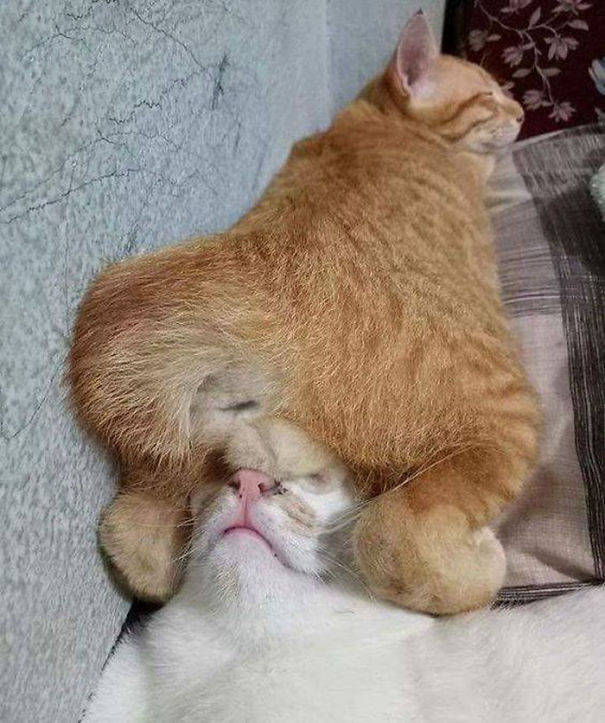Facts show that cats have a surprising ability to fall asleep in unusual places . They choose the most unlikely places, such as on doors, sinks and even glasses of milk, to rest. This peculiar behavior can be attributed to natural instincts and the need to feel comfortable and safe while sleeping.
Cats have a unique tendency to sleep in unusual places . In this section, we will explore possible reasons behind this choice, including routine variation and protection from predators.
Main points of the article:
- Cats sleeping in unusual places is the result of natural instincts to vary their routine and protect themselves from predators.
- Ambient temperature can influence where cats choose to sleep.
- The presence of pain can affect cats’ sleep and influence the choice of a place to rest.
- Fear can also be a determining factor in cats choosing a place to sleep.
- It’s important to watch for sudden changes in your cat’s sleeping behavior , as this could indicate health problems.
Why do cats choose unusual places to sleep?
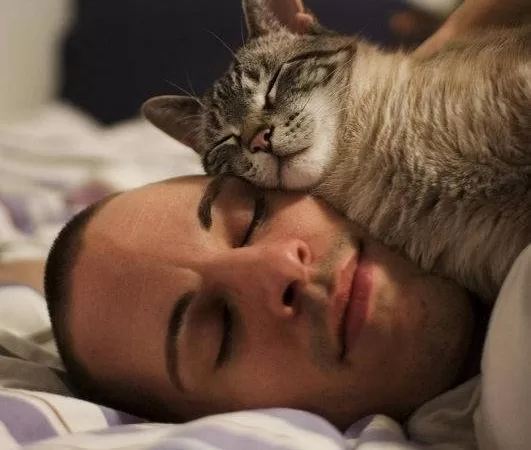
Cats are known for falling asleep in unusual places , seeking comfort and security. They can sleep on doors, sinks, chairs and even in milk glasses. These strange choices of sleeping places may be the result of natural instincts, such as the desire to vary the routine and protect themselves from predators.
Additionally, temperature changes can influence where a cat decides to nap. Cats are sensitive to temperature variations, preferring warm places in winter and cool places in summer. So, if you find your cat sleeping under a blanket in winter or near an open window in summer, it’s because they are seeking thermal comfort.
Pain can also influence the choice of a place to rest. Cats are very good at hiding signs of discomfort, but if you notice that your cat is sleeping in different places more often than usual, it could indicate that he is experiencing pain in a certain part of his body. In this case, it is important to take him to the veterinarian for a proper evaluation.
Fear also plays an important role in cats’ sleep . If your cat is hiding in unusual places to sleep, such as inside closets or under the bed, it could be a sign that he is feeling threatened or scared. It’s important to note any sudden changes in your cat’s sleeping behavior, as this may indicate the need for additional care.
| In summary: |
|---|
| Cats choose unusual places to sleep due to natural instincts, such as the need to vary their routine and protect themselves from predators. |
| Temperature changes can influence where a cat decides to nap, seeking thermal comfort. |
| Pain and fear can also affect the place chosen for rest, indicating possible health problems. |
Influence of temperature changes on cats’ sleep
Cats are temperature-sensitive animals and often choose their sleeping locations taking this factor into account. Temperature changes can directly affect the comfort of cats, leading them to seek warmer or cooler places to rest.
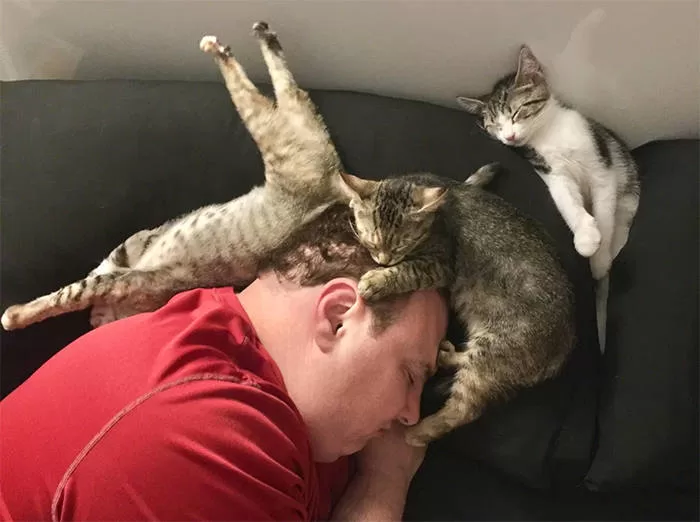
In cold conditions, it is common to see cats looking for warm places to sleep, such as on heaters, near fireplaces, or even in beds with cozy blankets. This occurs because cats seek thermal comfort, trying to keep their body temperature stable and avoid the discomfort of the cold.
On the other hand, on hot days, cats may seek out cooler places, such as tile surfaces or cooler wooden floors. Additionally, they can look for shady areas or areas with good air circulation to cool off. These choices are a natural way to regulate your body temperature and prevent overheating.
| General behaviors | Origin of the behavior |
|---|---|
| Look for warm places in cold conditions | Maintain stable body temperature |
| Look for cool places on hot days | Prevent overheating |
| Look for areas with shade and good air circulation | Regulate body temperature |
It is important to consider the ambient temperature when creating a suitable sleeping environment for your cat. Be sure to provide options for both hot and cold days, such as extra blankets or shaded areas. Observing and understanding your cat’s temperature preferences can help promote a peaceful, comfortable sleep for your feline.
Pain and its impact on cats’ sleep

Cats are known for falling asleep in unusual places, seeking comfort and security. They can sleep on doors, sinks, chairs and even in milk glasses. These strange choices of sleeping places may be the result of natural instincts, such as the desire to vary the routine and protect themselves from predators. However, an important factor to consider is the presence of pain and its impact on cats’ sleep.
Cats are animals sensitive to pain sensations, and this can directly affect their sleep. When a cat is in pain, he may avoid sleeping in places he used to prefer, such as soft pillows or cozy beds. Instead, he may choose to sleep in more rigid or elevated places in order to avoid any discomfort.
It is essential to pay attention to any changes in your cat’s sleeping behavior, as this may indicate the presence of pain or discomfort. If your cat starts sleeping in unusual places, such as on cold floors or hard surfaces, it may be a sign that he is experiencing some physical discomfort. In these cases, it is recommended to take the animal to the veterinarian for a proper evaluation and identify the source of the pain.
| Signs of pain in cats: |
|---|
| Difficulty getting up or moving |
| Lameness or lameness |
| More aggressive or withdrawn behavior |
| Excessive licking of specific areas of the body |
In the case of an underlying disease, such as arthritis or dental infection, appropriate treatment is essential to ensure your cat’s well-being and improve sleep quality. Therefore, if you notice any changes in your cat’s sleeping behavior, don’t hesitate to seek professional advice to help you.
Fear and its role in cat sleep
One of the factors that can influence where cats choose to sleep is fear. Just like humans, felines can also feel fear and this can affect their sleep behavior . When a cat feels threatened or scared, it tends to look for places where it feels safer and more protected.
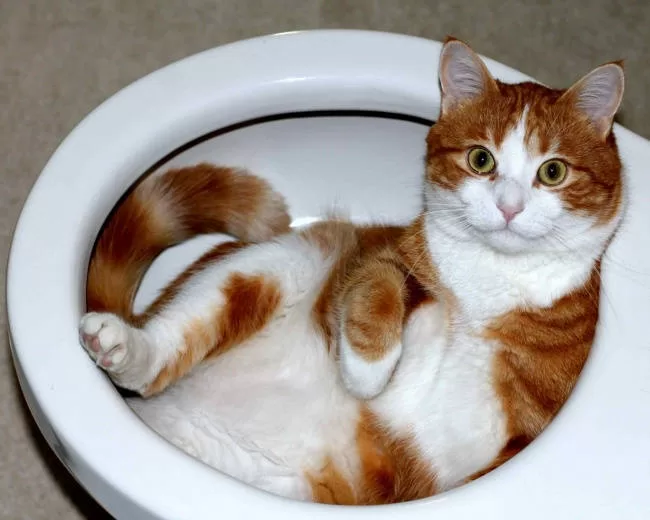
Fear can be triggered by several factors, such as loud noises, the presence of strangers or even sudden changes in the environment. These situations can make the cat prefer to sleep in more hidden places, where it feels less vulnerable. This can include under the bed, inside closets or even in tight, hard-to-reach places.
Additionally, it is important to observe whether the cat is showing signs of stress or anxiety, such as excessive licking, aggression or withdrawn behavior. These could be signs that your cat is feeling threatened and this could directly affect their sleep.
| Signs of fear in cats: | How to help your cat feel safer: |
|---|---|
| – Excessive meowing | – Provide a calm and peaceful environment |
| – Hide in unusual places | – Provide safe hiding places, such as boxes and huts |
| – Tremors or chills | – Avoid stressful or frightening situations for the cat |
| – Aggressiveness or withdrawn behavior | – Use appeasement pheromones to calm the cat |
It is important that owners are aware of signs of fear in cats and take the necessary measures to help them feel safer and more protected. This includes providing a calm environment, offering safe hiding places, and avoiding stressful situations. If the cat exhibits frequent or intense fearful behavior, it is recommended to seek guidance from a veterinarian specialized in feline behavior.
Observing behavioral changes in cats’ sleep
Cats are known for falling asleep in unusual places, seeking comfort and security. They can sleep on doors, sinks, chairs and even in milk glasses. These strange choices of sleeping places may be the result of natural instincts, such as the desire to vary the routine and protect themselves from predators. Additionally, temperature changes, pain, and fear can also influence where a cat decides to nap.
If you notice that your cat is suddenly sleeping in unusual places, it is important to pay attention and consider whether there are any associated changes in behavior. For example, if your cat used to sleep on the couch and now prefers to sleep under the bed, this could indicate physical or emotional discomfort. It is recommended that you take your cat to the veterinarian if you have any concerns.
Watching for signs of discomfort in cats
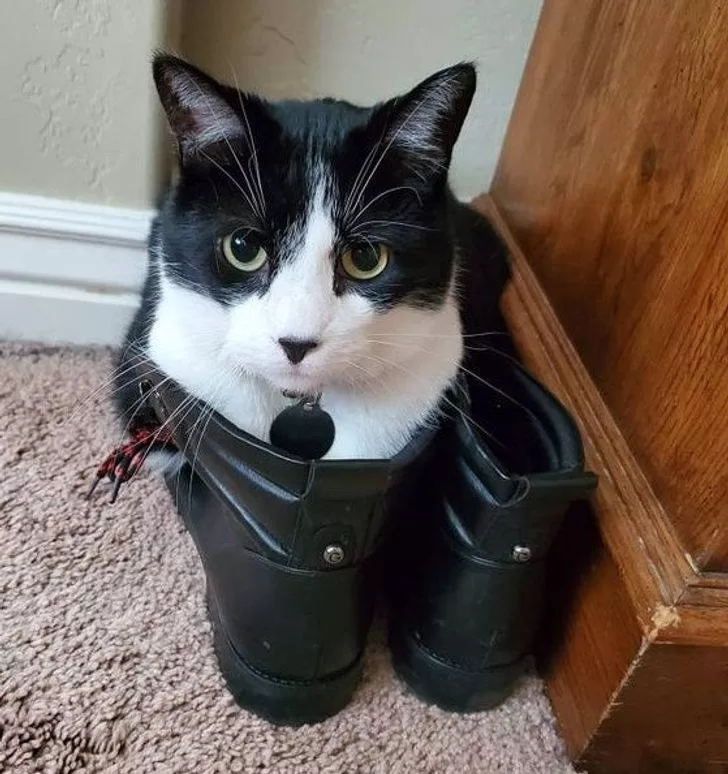
There are some clues that may indicate that a cat is experiencing some type of discomfort or health problem. Pay attention to signs such as restlessness during sleep, difficulty sleeping or snuggling, changes in appetite, unexplained weight loss, or lethargy. These signs may be indicative of underlying health issues that require veterinary attention.
Additionally, changes in sleep behavior can be a sign of stress or anxiety. Cats are sensitive to changes in their environment and may react to stressful situations by sleeping more or less than normal. If you suspect your cat is suffering from stress, try to identify possible causes and look for solutions to reduce the discomfort.
| Signs of discomfort in cats | Possible causes |
|---|---|
| Restlessness during sleep | Pain, physical discomfort |
| Difficulty sleeping or snuggling | Breathing problems, emotional discomfort |
| Changes in appetite | Digestive problems, illnesses |
| Unexplained weight loss | Diseases, metabolic problems |
| Lethargy | Diseases, pain, hormonal imbalance |
Observing your cat’s sleeping behavior is an important way to identify potential health problems. Pay attention to subtle, abnormal changes, as they could be indicative of something more serious. Cats’ sleep is a window into their health and well-being, and ensuring they have a restful sleep is essential to their quality of life.
Symptoms of Cat Sleep-Related Health Problems
Cats are incredible animals, with unique and fascinating sleeping behaviors. However, it’s important to be aware of any changes in your cat’s sleeping pattern, as this could indicate health problems. Here are some signs of illnesses that may be related to cats’ sleep:
- Insomnia or difficulty sleeping: If your cat is having difficulty falling asleep or waking up frequently during the night, this could indicate discomfort or pain.
- Apathy and lethargy: If your cat is sleeping more than usual and showing a lack of interest in playing or engaging in activities, this could be a sign of illness.
- Restlessness during sleep: Cats that move a lot while sleeping or have frequent nightmares may be suffering from stress, anxiety, or underlying health problems.
- Changes in appetite: If your cat is losing its appetite or showing a drastic change in eating habits, this could be a sign of illness and affect its sleeping pattern.
It’s important to watch for these signs and consult a veterinarian if you suspect your cat is sick. The professional will be able to make an accurate diagnosis and recommend the appropriate treatment to ensure your feline’s well-being.
| Health problem | Sleep-related symptoms |
|---|---|
| Chronic pain | Restlessness during sleep, difficulty sleeping, changes in sleep pattern |
| Heart diseases | Shortness of breath when sleeping, excessive tiredness during the day, snoring |
| Hyperactivity | Difficulty falling asleep , restlessness during sleep, restless sleep |
| Breathing problems | Noisy or wheezing breathing during sleep, snoring, sleep apnea |
Remember that every cat is different and may react uniquely to health problems. Therefore, it is essential to pay attention to your pet’s specific signs and seek veterinary care when necessary. By taking care of your cat’s sleep, you are ensuring their health and well-being.
How to provide a suitable sleeping environment for cats
Cats are animals that value comfort and security when sleeping. To provide a suitable environment for felines to sleep, it is important to consider some essential aspects. One of the main factors to be observed is the temperature of the environment. Cats prefer places with a mild temperature, neither too hot nor too cold. Make sure the place where your cat usually sleeps is well ventilated and at a pleasant temperature.
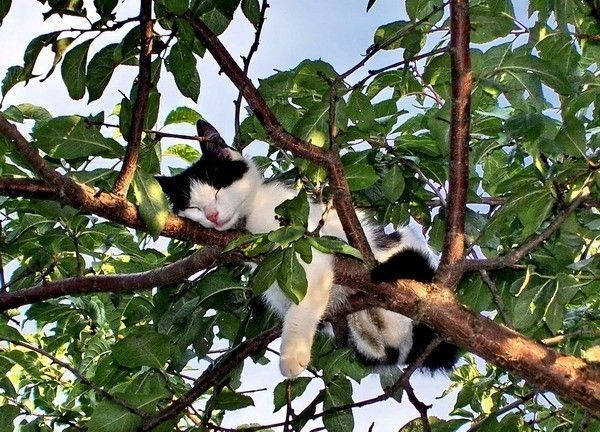
Another important aspect is the choice of the location itself. Cats love having options and choosing where to sleep. Provide different types of soft surfaces for your cat, such as a comfortable bed, pillows or blankets. Additionally, make sure the place is quiet and free from disturbances that could interrupt your feline’s sleep.
The layout of the environment is also relevant. Cats like to have a wide view of the space around them so they feel safe while they sleep. Make sure that the place chosen for your cat to sleep is in a strategic location, where it can observe the environment without feeling exposed to possible threats.
Last but not least, it is essential that the sleeping environment is cleaned and sanitized regularly. Cats are very clean animals and like to sleep in clean places. Always keep your cat’s bed clean, free from dust and accumulated hair. This will ensure your feline’s comfort and health while he rests.
Curiosities about cat sleep
When observing cats’ sleeping habits, we may come across curious and adorable behaviors. Here are some fascinating facts about feline sleep:
- Cats are considered crepuscular animals, meaning they are most active during dawn and dusk. This is also reflected in your sleep pattern, which is often divided into several naps throughout the day.
- Have you ever noticed that cats often blink their eyes slowly before falling asleep? This movement is known as the “slow blinking eye” and is a sign that the cat feels safe and relaxed around you.
- While humans dream primarily during REM (rapid eye movement) sleep, cats can dream during both REM and slow-wave sleep. During these dreams, you may notice subtle paw movements or even the cat meowing in its sleep.
- Cats have the ability to sleep in positions that seem uncomfortable to us humans, such as curled up in a ball or sprawled out with their paws up. This is because cats have a flexible skeleton and loose joints, allowing them to accommodate themselves in any position.
“Cats have unique and fascinating sleep behaviors, providing a deeper look into this topic.”
These interesting facts about cat sleep show us how interesting and peculiar the feline world is. Observing and learning about cats’ sleeping behavior can help us better understand these incredible animals and ensure they have a suitable environment to rest and recharge.
| Curiosities about cat sleep | |
|---|---|
| Did you know? | Cats spend about 70% of their lives sleeping. |
| Catnap | A quick 15 to 30 minute nap is called a “catnap.” |
| Deep sleep | Cats have the ability to fall into a deep sleep within minutes. |
These fun facts not only entertain us but also make us appreciate the uniqueness of cats and bring us closer to these adorable pets.
Conclusion: The importance of sleep for cats
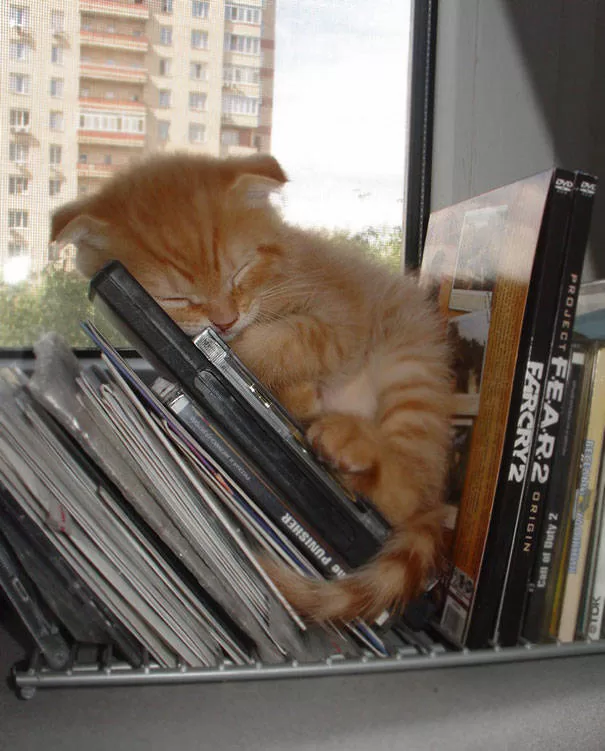
Cats have a unique way of falling asleep in unusual places , seeking comfort and security. Whether on doors, sinks, or even in milk glasses, these strange choices may be the result of natural instincts and needs for variety and protection from predators.
Additionally, factors such as temperature changes, pain and fear can also influence where cats choose to sleep. Temperature variations can lead them to seek warmer or cooler places, ensuring their thermal comfort. Pain can directly interfere with sleep, making people choose more comfortable places to rest. Fear also plays an important role, leading them to look for safe places where they can hide and feel protected.
It is essential to be aware of sudden changes in your cat’s sleeping behavior , as this may indicate health problems. If a cat starts to sleep in unusual places or has difficulty sleeping, it is recommended to take it to the veterinarian for a proper evaluation. Inadequate sleep can be a symptom of different health problems, and only a professional can make an accurate diagnosis.
In short, sleep is essential for the health and well-being of cats. Providing an adequate environment, with comfort and safety, is essential to guarantee a peaceful sleep. Observing the sleeping behavior of cats and being alert to possible signs of illness is a way to guarantee the quality of life of these special pets.
FAQ
Q: Why do cats choose unusual places to sleep?
A: Cats have a unique tendency to sleep in unusual places. This choice may be the result of natural instincts, such as the search for comfort and security, as well as the desire to vary the routine and protect themselves from predators.
Q: How does temperature affect cats’ sleep?
A: Ambient temperature can influence cats’ choice of sleeping location. Changes in temperature can affect felines’ thermal comfort and influence where they decide to nap.
Q: Can pain impact cats’ sleep?
A: Yes, pain can directly affect cats’ sleep. Cats are sensitive to sensations of pain and discomfort, and this can influence the choice of a place to rest. It is important to watch for signs of discomfort in cats and seek veterinary care if necessary.
Q: What is the role of fear in cats’ sleep?
A: Fear can also be a determining factor in cats choosing a place to sleep. When they feel threatened or scared, cats may look for places they consider safer to rest.
Q: What changes in cat sleep behavior may indicate health problems?
A: Sudden changes in cats’ sleeping behavior may indicate health problems. If a cat suddenly starts sleeping in unusual places, it is recommended to take the cat to the veterinarian for a medical evaluation.
Q: What are the symptoms of sleep-related health problems in cats?
A: Some health problems can manifest themselves through changes in cats’ sleeping behavior. Symptoms such as difficulty sleeping, restlessness during sleep or excessive drowsiness may indicate the need for veterinary care.
Q: How to create a suitable sleeping environment for cats?
A: Providing a cozy and safe environment is essential for cats to sleep peacefully. Be sure to offer comfortable beds, quiet places that meet the feline’s comfort and safety needs.
Q: What interesting facts are there about cat sleep?
A: Cats have unique and fascinating sleeping behaviors. Curiosities such as the fact that they sleep an average of 12 to 16 hours a day and have a lighter sleep than humans can be explored in this article.
Q: How important is sleep for cats?
A: Adequate sleep is essential to the health and well-being of cats. During sleep, they repair tissues, process information and recharge the energy needed for daily activities. Ensuring quality sleep is essential for feline health.
Source Links
- https://pt.secrettohappypets.com/is-cat-sleeping-in-unusual-places-sign-of-sickness-6446
- https://www.tudointeressante.com.br/2022/07/22-gatos-que-resolveram-dormir-nos-lugares-mais-improvaveis-possiveis.html
- https://www.bnews.com.br/noticias/bnews-pet/gato-com-sono-procura-local-para-dormir-e-se-aconchega-em-lugar-inusitado-assista.html

